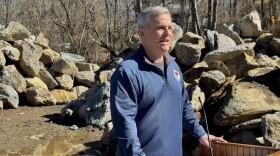Nearly a year ago, Helene brought unprecedented flooding to western North Carolina – wiping out roadways, triggering more than 2,000 landslides, and taking the lives of more than 100 people. The Swannanoa Valley was especially hard hit, home to a namesake river that broke a flood record after it crested over 26 feet.
About two and a half miles of the river runs through Warren Wilson College, which had to shut down for almost a month after Helene left it with no power, cell phone connectivity, or running water.
Helene also damaged half of Warren Wilson's buildings, felled over 100 of its trees, and left 70,000 cubic yards of debris after flooding the campus farm. President Damian Fernández said restorations are still ongoing and have cost the college $12 million.

"We have made impressive progress, great accomplishments, but the devastation that Helene brought on us was so significant that we still have issues that we are grappling with," Fernández said. "These issues are not always easy. They're insurance, FEMA, uncertainty around state support."
In June, the General Assembly approved a $500 million Helene recovery package. It included more than $4 million in relief for the state's private colleges and universities.
A subcommittee of Republican legislators appropriated the majority to nearby colleges, Lees-McRae and Montreat, which received $1.5 million each. The lawmakers excluded Warren Wilson.
Fernández said his campus could've used that money to fill a $2 million funding gap.
"We – like Montreat College, like Lees McRae – we were the colleges that were most affected and the ones that had widespread destruction and challenges to reopen," Fernández said. "I was surprised the House (conference) bill didn't include us. We don't understand why." (Editor's note: the appropriation was a House conference committee bill and not a full House bill)
"We are just asking for equal treatment, fair treatment," Fernández said.
Shortly before the school year started, Fernández hosted several state officials on campus: Senator Julie Mayfield, D-Buncombe; Representatives Karl Gillespie (R-Cherokee), Lindsey Prather (D-Buncombe), Ray Pickett (R-Alleghany); and Holly Jones, the director of the governor’s Western North Carolina Office.

Fernández spent the visit showing them around, and explaining the damage miles of floodwater can wreak on a campus.
"Officials from both sides of the aisle attended and were impressed with our accomplishments, but also were awestruck with the kind of challenges," Fernández said.
Restoration crews are still removing trees, repairing the college's fences and roads, and working on several other cleanup efforts.
"We were impacted as much, if not more, than our sister and peer schools. This is something that remains to be done and we are committed to advocating," Fernández said. "We hope that the right thing will be done so we can continue impacting our students and our greater region."
According to Fernández, Warren Wilson has a $50 million annual impact on North Carolina's economy. Forty percent of the college's students are from North Carolina, and Fernández said most tend to stay in the region after graduation.
"We provide this kind of hands-on real world experience that is essential for the economy of our region to prosper," Fernández said. "Despite the initial impact of the decision – the initial frustration and lack of understanding – I've been received with open arms by our leaders. And I hope that this is going to be solved sooner rather than later."
Although Warren Wilson is still recovering from Helene, Fernández said the campus is bouncing back with an "energetic momentum." Classes resumed this week and the college welcomed its largest first-year class since the pandemic at 258 students.

Fernández said he believes the campus' story of resilience helped with recruitment.
"It has been remarkable how our communication strategy opened us up to the world," Fernández said. "Those strong community bonds – it forged a connection to our place, our mission… so the adversity had a silver lining which was really to help us connect to one another."
As hurricane season approaches again, Warren Wilson is using Helene to prepare for future disasters.
The college's new public safety director is updating protocols and improving training for the campus emergency response team. He's also boosting the college's relationship with local first responders and will be part of a new Buncombe county-wide emergency management committee.
In the coming weeks, Fernández said Warren Wilson will mark the anniversary of the storm with several events and service-learning opportunities. This includes a 190-acre preserve to conserve trees in the campus forest to a Swannanoa River cleanup day.
"Helene marked this region. We are part of this place," Fernández said. "We are a scrappy place where we work hard. We have that ethic of hard work. Our students have been at the front lines of the recovery effort, and they've learned a lot as how one becomes resilient individually, as an institution, and as a community."
WUNC partners with Open Campus and NC Local on higher education coverage.









